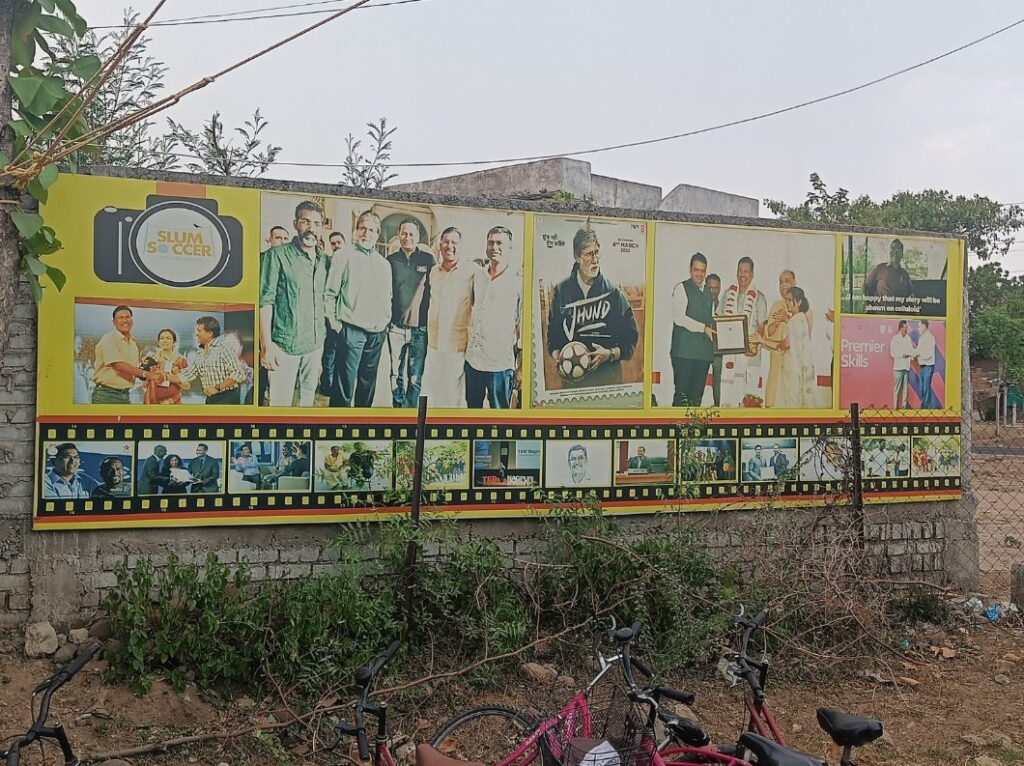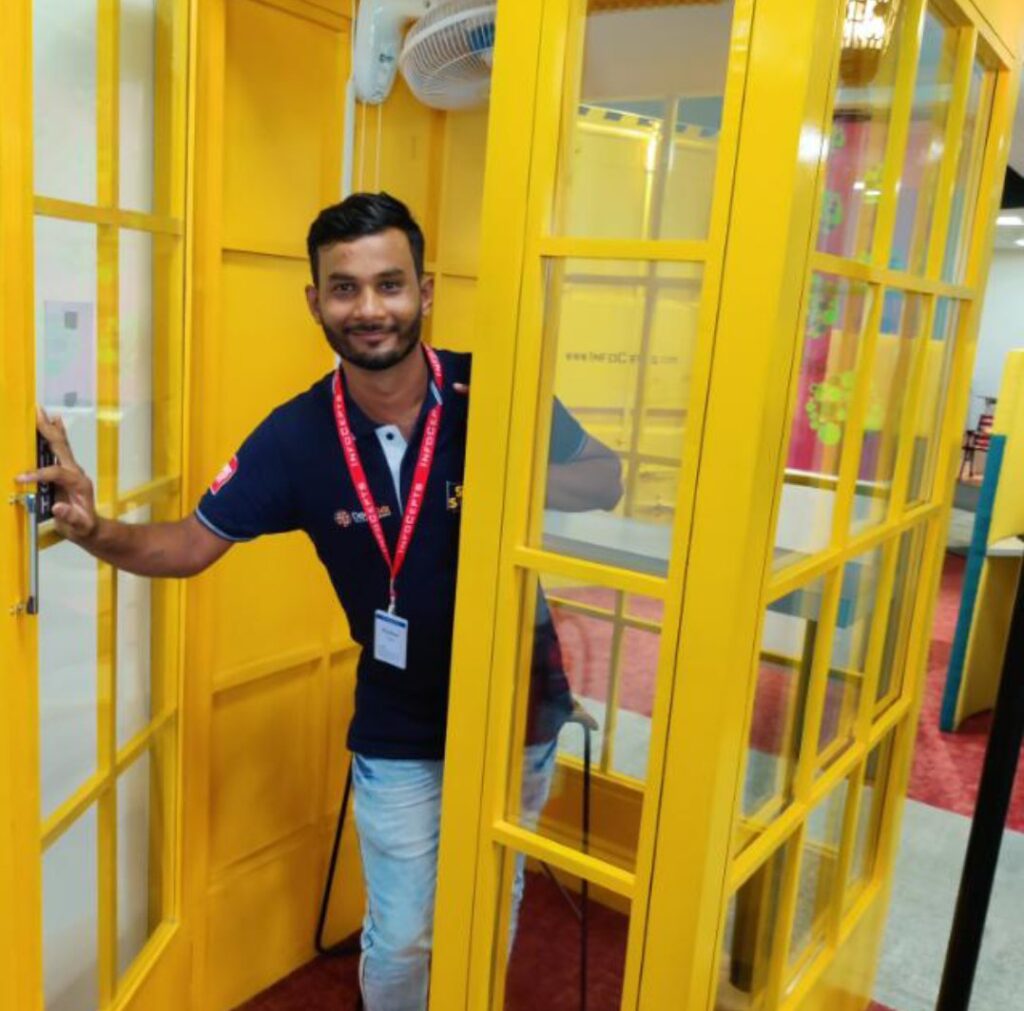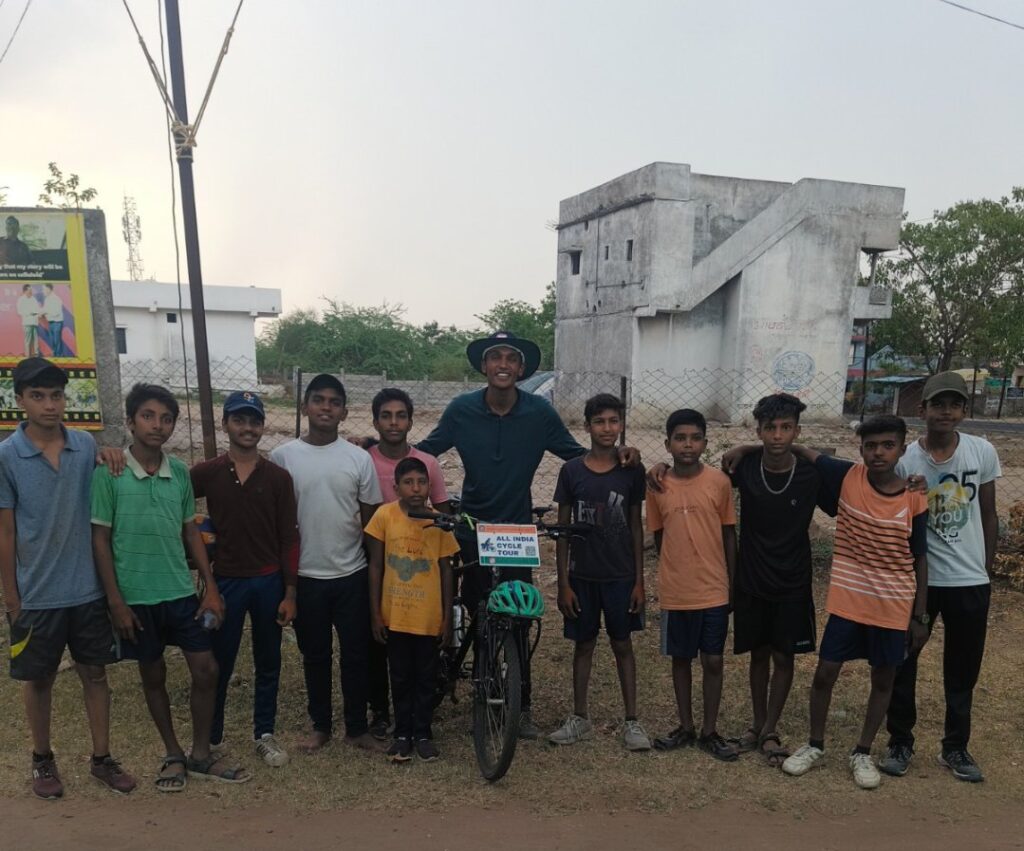Inside story of an underprivileged individual whose life changed drastically on joining SLUM SOCCER
NGO organizations dedicated to providing education to underprivileged children have witnessed transformative impacts on numerous lives. While each organization operates in its own distinctive manner, most rely on fundraising efforts to support their cause. Among these organizations, one based in Nagpur city, Maharashtra, has gained recognition for its innovative approach to empowering children through education and sports, known as “slum soccer.” Founded by Mr. Vijay Barse, Slum Soccer utilizes football as a means to engage children in a sport that not only steers them away from negative activities but also facilitates their access to education. The organization’s remarkable impact has garnered attention to the extent that a film titled ‘Jhund,’ featuring Amitabh Bachchan, has been produced, shedding light on their inspiring work.

During my all-India cycle tour, I had the incredible opportunity to meet Pankaj Mahajan, who serves as a manager at the Slum Soccer campus in Nagpur. Pankaj is involved with two remarkable projects, namely “Under the Wings Pitch for Progress” and “Shakti Girls,” which focus on using football as a means to promote the overall well-being of children and empower women.

Engaging in a conversation with Pankaj completely shifted my perspective on sports and its connection to education and a better life. Through my interaction with him, I gained valuable insights into the inner workings of Slum Soccer, which opened my eyes to the potential of combining education and sports seamlessly.
The encounter with Pankaj and learning about the initiatives at Slum Soccer provided me with a fresh outlook on the role of sports in shaping lives and the significant impact it can have on education.
Inception of the brilliant idea to help the underprivileged slum kids
Vijay Sir, a former physical education teacher at Hislop College in Nagpur, came up with a simple yet brilliant idea when he witnessed slum children engaging in drug activities on the college grounds. He conceived the notion of hosting a football tournament specifically for these children. In December 2000, he invited them to play the following morning and was amazed by their enthusiasm. This led to the successful organization of a tournament with over 100 participating teams.
Today, Slum Soccer operates in Mumbai, Chennai, Kolkata, Delhi, Pune, and indirectly in 24 states across India. They utilize community grounds for their programs, teaching children football. The organization conducts district, national, and state-level championships and gained international recognition through the Inclusion Cup, covered by BBC News in 2007. They have also participated in the Homeless World Cup annually, with Indian teams competing since 2006.
Initially funded by Vijay Sir, Slum Soccer has garnered support from organizations such as HAL, Reliance, Bookers Mile, FIFA Foundation, and Tottenham Hotspur. They run various programs, including “Pitch for Progress,” which teaches life skills through the game, and “Deaf Kids Goal,” where deaf individuals teach deaf children to play football with support from Comic Relief. The organization has expanded to include other sports like volleyball, kabaddi, and athletics, running programs in schools with government support.
Slum Soccer’s impact reaches thousands of underprivileged children each year, with approximately 10,000 to 12,000 kids being supported nationwide. Nagpur alone caters to 5,000 to 6,000 children, with 70 coaches across India, including 50 in Nagpur, all from underprivileged backgrounds who grew up in the organization, including Pankaj himself.


Projects for improvement have been undertaken in the Seemapuri community (Model City Delhi program) in Delhi and Walda districts of West Bengal. The organization’s motto is “Development Within.” They aim to uplift the entire underprivileged slum community, promoting education not only for individual growth but also for the betterment of their communities.
Life of an underprivileged individual whose life changed upon joining slum soccer
Pankaj Mahajan’s upbringing was marked by poverty and family challenges. His father, an alcoholic who ran a pan shop, squandered their earnings on alcohol. Pankaj’s mother, despite having a disability in one leg, became the family’s primary breadwinner, working as a farm laborer. At a young age, Pankaj started smoking beedis, but his father did not intervene. Even as a fourth-grader, Pankaj smoked without any concern from his father, who failed to provide support or guidance.
Academically, Pankaj struggled and managed to pass 10th grade with a meager 36% marks. Eventually, in 2012, he dropped out of school altogether and ran away from home. It was at this point that he found solace in Slum Soccer, an organization dedicated to uplifting underprivileged youth through sports.
Joining Slum Soccer in 2012 ignited Pankaj’s passion for the game. By 2013, he had become a skilled athlete and earned a place on the Indian team for the Homeless World Cup in Poland. It was during this event that Pankaj had an encounter with an American child who tried to communicate with him, but Pankaj’s lack of understanding led to a heated exchange. Witnessing this incident, an Indo-American woman emphasized the importance of asking questions and learning when faced with unfamiliar situations, instead of resorting to conflict.
Upon returning to India, Pankaj realized the necessity of learning English. He began by conversing with Vijay’s son, Mr. Abhijit, and learned basic words such as “I,” “me,” and “you.” Pankaj then devoted himself to daily dictionary study, steadily improving his reading skills. Recognizing his dedication, Slum Soccer encouraged him to re-enroll in 12th grade, which he successfully completed in 2013, signifying the start of a transformative journey.
Pankaj’s thirst for knowledge propelled him to pursue higher education. He completed his BPE (3 years), B.PEd (2 years), and is currently pursuing his M.PEd (2 years). He developed a strong desire to study abroad, which remains his aspiration. Slum Soccer acknowledged his passion and supported him in attending the Coach Training Program sponsored by Adidas in Vietnam in 2014. Pankaj attributes his realization of the importance of education to his international experience in 2013. Today, he is not only fluent in English but also works as a content writer for Slum Soccer.
In 2014, tragdy struck when Pankaj’s father took his own life, unable to bear the shame associated with his son’s success and his own label as a drunkard. Pankaj, who had been away from home at Slum Soccer, returned to take care of his mother. By this time, he had also begun earning money as a football coach. Pankaj ensures that his mother leads a peaceful life and provides her with the care she deserves. Over time, Pankaj rose through the ranks and became the coach of the team that represented India at the Homeless World Cup in 2017, Norway. Presently, he serves as the manager of the Wings Pitch for Progress and Shakti Girls at Slum Soccer, continuing to make a positive impact on the organization as both a coach and content writer.
Mindset of an underprivileged individual who realized the importance of education
Pankaj Mahajan’s journey from a disadvantaged background to his educational accomplishments undoubtedly exposed him to contrasting experiences. Curiosity compelled me to delve into his mindset, seeking to comprehend the person he had become. Through further inquiry, I began to grasp how a child from an underprivileged background could be profoundly influenced and motivated to strive for a better life when provided with appropriate guidance and training.
Justification and validation
Pankaj Mahajan firmly believes that he can serve as a source of inspiration for others. It is his life’s motto to become someone whom people can look at and say, “Look at him, he has achieved significant success.” He acknowledges that in the past, people used to refer to him as a drug addict, but now he wants to be seen as a role model worth following.
Pankaj’s driving force is the desire to be a motivation and inspiration, especially for children who come from backgrounds similar to his own He aims to show them that despite the challenges they may face, they can achieve great things in life. Pankaj takes pride in demonstrating his skills, such as typing fast on a computer, which piques the curiosity of those around him. When children inquire about what he is reading, he gladly invites them to read alongside him, fostering a sense of fulfillment and positivity within him.
Pankaj’s justifications and validations lie in his aspiration to make a positive impact on others, particularly those who may be going through similar circumstances. By becoming an example of triumph over adversity, he hopes to instill hope, motivation, and a belief in the potential for success in the lives of those who look up to him.
Complaints
Pankaj Mahajan expressed two complaints that have shaped his perspective on education and the importance of sports for children. Firstly, he laments that if his parents had prioritized his education earlier, he might have had a different trajectory in life. However, he has taken it upon himself to address and resolve this complaint, working diligently to overcome the obstacles he faced.
Another complaint Pankaj raised is the lack of understanding among parents regarding the significance of sports in a child’s development. He believes that sports should not be limited to a certain grade level, as parents often assume, but should be an integral part of a child’s overall growth. According to Pankaj, sports serve as an excellent tool for problem-solving and can effectively teach valuable life skills. He emphasizes the creation of games that incorporate community situations and provide a platform for children to experience and learn from.
Pankaj’s involvement as a Coaches Across Continents representative and a sports for development educator has deepened his conviction that games can be designed to teach various concepts. He firmly believes that through play, children can acquire knowledge and skills that go beyond what books alone can offer. At Slum Soccer, the ultimate goal remains the development of individuals within the community, and they employ diverse methodologies to achieve this.
Pankaj urges parents to allow their children more time for play, as he believes that it is through play that they can gain invaluable life lessons. He encourages parents to recognize the immense learning potential embedded within sports and advocates for a balanced approach to education and sports in a child’s upbringing.
Materialism
When asked what he would do if he were given a substantial amount of money, Pankaj expressed his strong desire to open a school specifically catering to deaf children. He believes that the current state of education for deaf individuals is a scam, as these children often face limited employment opportunities in society. Pankaj aspires to provide them with quality education that focuses on visual learning.
Having gained exposure to working with deaf children through his involvement with Slum Soccer, Pankaj feels confident in his ability to make a positive impact. He recognizes the unique challenges faced by deaf individuals and believes that a school dedicated to visual study would be highly beneficial. Pankaj’s goal is to create an environment where deaf children can receive comprehensive education and support, enabling them to overcome barriers and achieve success.
By utilizing his experiences and knowledge gained from working with deaf children, Pankaj envisions a school that empowers and equips these individuals to lead fulfilling lives. He hopes that by realizing this dream, he can make a significant difference in the lives of deaf children and contribute to a more inclusive and supportive society.
When asked about his message to the world, Pankaj shared that he had several important points to convey. He expressed his growing awareness of environmental issues, as well as concerns regarding education and population. However, he emphasized that above all else, his primary message would revolve around the significance of children engaging in sports and encouraging everyone to experience it and promote its participation.
Pankaj strongly believes that children should actively participate in sports as it offers numerous benefits and enriching experiences. He advocates for the inclusion of sports in the lives of children, highlighting its ability to foster important life skills such as teamwork, discipline, and resilience. Pankaj encourages people of all ages to engage in sports activities, emphasizing the valuable experiences and personal growth that can be gained from participation.
Do you agree with Pankaj’s point of view? Comment below and let me know. To read about a NGO organization headed by a westerner settled in India who has poured his entire life into it, head to this article.
I am a 31 year young PhD graduate who has decided to travel the length and breadth of India on my cycle, to document the journey of meeting a vast array of people. In my journey, I intend to understand the characteristic features of the people of this nation and categorize them based on their demographics, age, profession, gender, traditions, and cultural differences.